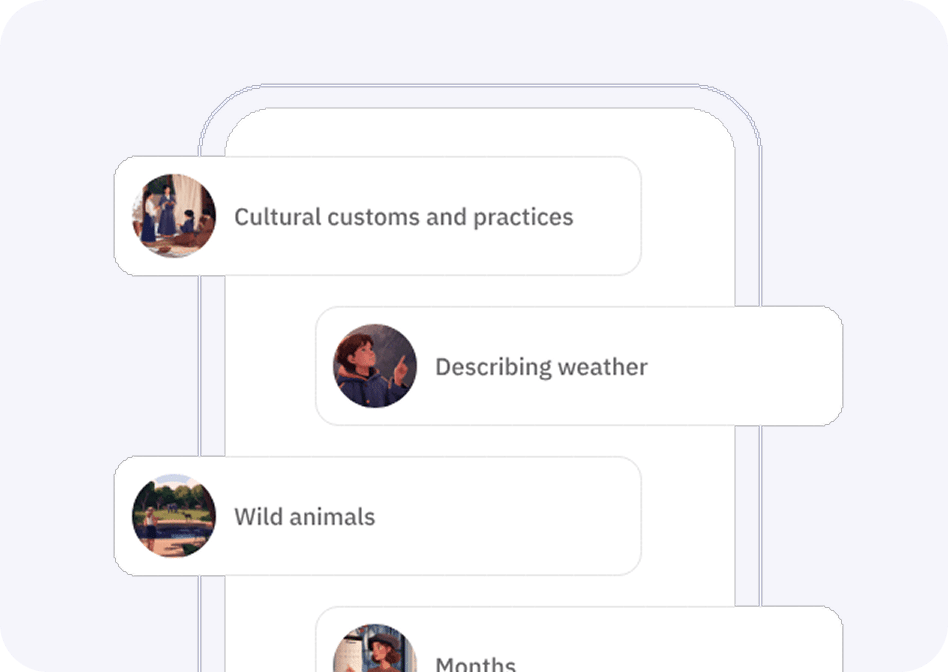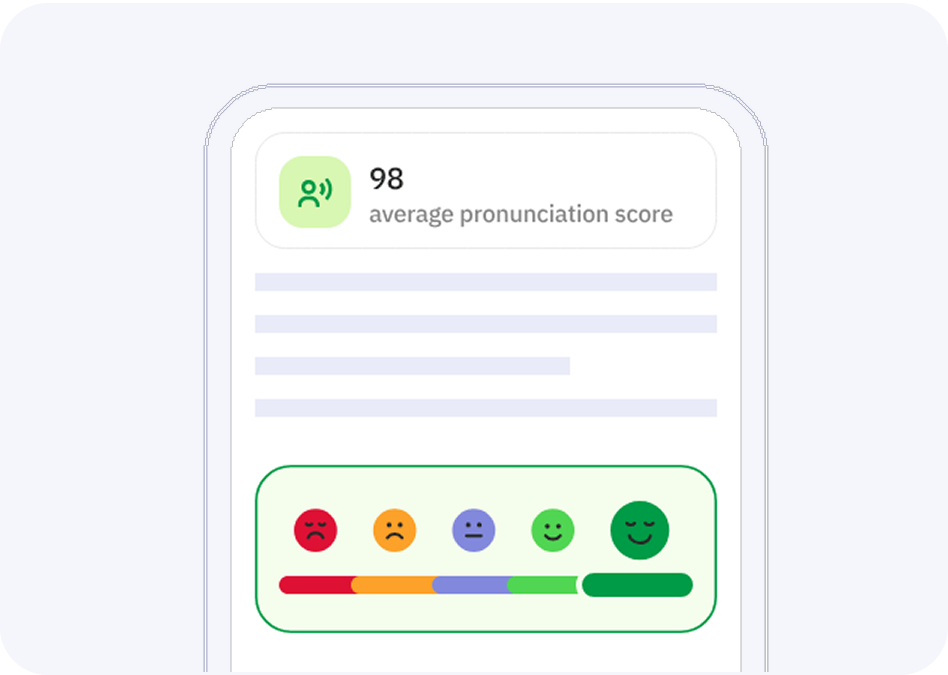Learn Swahili
Learning Swahili is an exciting way to connect with millions of people across East Africa. As one of the continent’s most widely spoken languages, Swahili opens doors to vibrant cultures, rich histories, and a wealth of literature and music. Its straightforward grammar and familiar vocabulary borrowed from Arabic make it accessible for beginners, while practicing with native speakers can quickly boost confidence. Whether for travel, work, or personal growth, picking up Swahili is a rewarding journey that broadens both communication skills and worldviews.
Get startedThe talkpal difference

Personalized Education
Every student’s journey to learn Swahili is unique. With Talkpal's state-of-the-art technology, we analyze how millions of individuals learn simultaneously, allowing us to craft the most efficient educational platforms tailored to each learner's needs.

Cutting-Edge Technology
Our mission is to democratize access to personalized learning experiences using the latest advances in technology. Whether you’re a beginner or already familiar with Swahili, our tools adapt to your level, offering a seamless learning experience.

Making Learning Fun
Learning Swahili should be an adventure, not a chore! Talkpal transforms language learning into an engaging and enjoyable journey. With our platform, you'll be so engrossed in mastering Swahili that it feels more like play than study.
LANGUAGE LEARNING EXCELLENCE
Talkpal Swahili Learning Method
Learning Swahili might seem daunting, but with the right tools and approach, it becomes an enriching experience. Here are some effective strategies to help you achieve fluency in Swahili.

1. Immerse Yourself
One of the best ways to learn Swahili is through immersion. Surround yourself with the language by watching Swahili films, listening to Swahili music, or conversing with native speakers. Immersion accelerates your learning process by helping you pick up new words and phrases and familiarizing you with the language's rhythm and structure.

2. Practice Consistently
Consistency is key to learning Swahili. Make it a part of your daily routine, whether you're studying grammar rules or practicing speaking skills. Regular practice helps maintain motivation and ensures steady progress towards fluency.

3. Use Available Resources
There are numerous resources available for learning Swahili, from textbooks to language apps. Diversifying your resources keeps learning fresh and engaging. Different tools may be more effective for various aspects of the language, like grammar or vocabulary, so find what works best for you.

4. Focus on Relevant Vocabulary
Rather than trying to learn every word, focus on vocabulary relevant to your interests and daily life. This targeted approach keeps you engaged and aids in better retention of new words and phrases.

5. Find a Language Partner or Chat
Practicing with a language partner can significantly improve your Swahili speaking skills and provide valuable feedback. Language exchange websites, apps, or local Swahili language groups are great places to find partners.

6. Set Realistic Expectations
Setting achievable goals is crucial for staying motivated and making progress. Whether it's learning a set number of words each week or holding a conversation in Swahili, realistic goals help you stay on track and celebrate your accomplishments.

7. Don't Be Afraid to Make Mistakes
Making mistakes is a natural part of the learning process. Embrace them as valuable learning opportunities and focus on steady progress towards your Swahili learning goals.
The most efficient way to learn a language
Try Talkpal for freeDISCOVER THE BEAUTY OF SWAHILI: YOUR ULTIMATE GUIDE TO LEARNING THE LANGUAGE
If you’ve ever dreamt of exploring the wonders of East Africa or immersing yourself in its rich cultural heritage, learning Swahili is the perfect starting point. As one of the most widely spoken languages in Africa, Swahili connects millions of people across different countries and cultures. So, why not join the conversation? In this article, we’ll uncover the basics of Swahili, explore its history and significance, and guide you through the most effective strategies to learn this beautiful language. Ready to embark on this linguistic journey? Let’s dive in!
The History and Significance of Swahili
Swahili, also known as Kiswahili, is a Bantu language native to the African Great Lakes region, primarily spoken in countries like Tanzania, Kenya, Uganda, Rwanda, Burundi, Mozambique, and the Democratic Republic of Congo. With over 100 million speakers, Swahili serves as a lingua franca, bridging the gap between diverse ethnic groups and promoting unity and understanding.
The origins of Swahili can be traced back to the Bantu people who migrated to the East African coast around the 2nd century AD. Over time, the language evolved and absorbed elements from Arabic, Persian, and even European languages due to trade and colonization. Today, Swahili is recognized as an official language of the African Union and is widely taught in schools, making it an essential skill for anyone interested in exploring the region.
Top Tips for Learning Swahili
1. Start with the basics
As with any language, it’s crucial to master the fundamentals of Swahili, such as the alphabet, pronunciation, and basic grammar rules. Familiarize yourself with common phrases and greetings to help you engage in simple conversations. For instance, learn how to say “hello” (habari), “please” (tafadhali), and “thank you” (asante).
2. Immerse yourself in the language
One of the most effective ways to learn Swahili is by immersing yourself in the language. Watch Swahili movies, listen to music or podcasts, and try to read books or articles written in Swahili. This will not only help you expand your vocabulary but also improve your listening and comprehension skills.
3. Practice speaking with native speakers
Don’t be shy to practice speaking Swahili with native speakers. Look for language exchange partners, join local language clubs, or even consider traveling to a Swahili-speaking country to fully immerse yourself in the language and culture. Remember, practice makes perfect!
4. Utilize technology
In today’s digital age, there are countless resources available to help you learn Swahili. From language learning apps like Duolingo and Memrise to online courses and YouTube tutorials, you’ll find plenty of tools to suit your learning style and schedule.
5. Stay consistent and motivated
Learning a new language takes time and dedication. Set realistic goals for yourself, create a study plan, and track your progress over time. Remember to stay patient and celebrate your achievements, no matter how small they may seem.
Conclusion
Learning Swahili opens up a world of possibilities, allowing you to connect with millions of people and explore the rich cultural heritage of East Africa. By following these tips and staying committed to your language learning journey, you’ll soon be able to speak Swahili fluently and confidently. So, what are you waiting for? Start learning Swahili today and unveil the beauty of this fascinating language. As they say in Swahili, “Hakuna matata” – no worries, you’ve got this!
How does Talkpal work for learning Swahili?
Talkpal AI uses a conversational method for language learning, allowing learners to practice Swahili with native speakers and AI-powered chatbots. The app features:

1. Speech Recognition
Talkpal AI employs speech recognition technology to analyze your speech and provide feedback on pronunciation, intonation, and rhythm, helping you sound more natural when speaking Swahili.

2. Conversation Practice
Practice Swahili with native speakers and AI chatbots within the app to improve your listening and speaking skills naturally and conversationally.

3. Vocabulary Building
Expand your Swahili vocabulary with tools such as flashcards and word games, making it easier to retain new words.

4. Grammar Practice
Refine your grammar skills with targeted exercises. The app uses AI technology to identify areas for improvement and offers personalized feedback to boost your proficiency.
The most efficient way to learn a language
Try Talkpal for free







